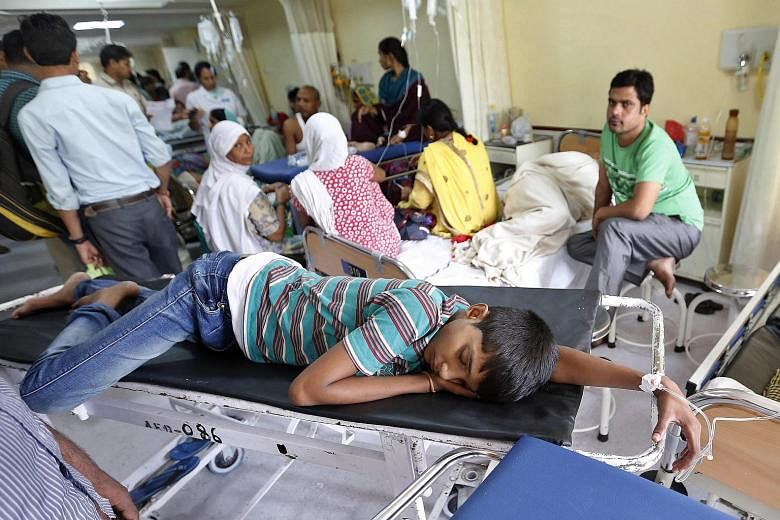NEW DELHI (AFP) - Hospitals in the Indian capital struggled on Wednesday (Sept 16) to cope with a flood of patients suffering from dengue fever as the Delhi government warned against turning away anyone seeking treatment.
Patients told of sleeping on pavements outside emergency rooms and doctors said services were stretched to breaking point following the worst outbreak in New Delhi in five years.
Dengue fever, a mosquito-born disease with no known cure or vaccine, strikes fear into citizens of northern India when it arrives with the monsoon rains.
The Press Trust of India says that at least 11 people have already died from it this year. With more than 1,800 confirmed dengue cases, the number has already surpassed the record-breaking year of 2010, with weeks left in the annual season.
Delhi health minister Satyendar Jain held a crisis meeting on Tuesday night, warning hospitals that they face stiff penalties including licence cancellations if they are found rejecting patients.
"While (there are) over 1,800 dengue cases so far... it can't be called an epidemic," Jain told reporters on Wednesday.
"Yes, people are in a panic right now (and) it is the government's responsibility to act." "We will add at least 1,000 to 1,500 beds for patients," Jain said.
Authorities have been spurred into action after two children, aged seven and six, died separately from the disease after their parents were allegedly turned away from several hospitals, sparking a public outcry.
The grief-stricken parents of one of the boys committed suicide by jumping off the roof of a four-storey building.
- No admissions -
At the government-run Dr Ram Manohar Lohia hospital on Wednesday, two patients - some hooked up to drips - were squeezed into some single beds.
After travelling from the nearby tourist city of Agra with his sick brother-in-law, Subodh Trivedi was told to go elsewhere. But Subodh eventually found an empty gurney and wheeled his ailing relative inside, demanding treatment.
"With his critical condition we couldn't take him anywhere else at the time. And inside the crammed emergency ward, there were no beds or even space on the floor," Subodh told AFP.
An exhausted doctor said staff were handling double the number of patients than normal in Delhi, which is always the worst-hit city.
"We have around 120 patients in the ward against 50 or 60 that we usually handle," the on-duty doctor told AFP.
"These dengue patient numbers have obviously affected the time and attention we can give to other serious cases also admitted in the section," he added.
Pradeep Singh Rawat, 17, spent one night waiting for treatment, including sleeping on the pavement with his father Virender last week.
"I came here after a test at a private lab showed my son had dengue. We were told there were no admission slots, so we spent the night outside till one opened for him," Virender said.
Delhi authorities, under fire for initially failing to act swiftly on the outbreak, have blamed prolonged humidity for this year's rise in infections.
The virus affects two million people across the globe annually, with the number of cases up 30 times in the last 50 years, according to the World Health Organisation.
Transmitted to humans by the female Aedes aegypti mosquito, it causes high fever, headaches, itching and joint pains that last about a week.

